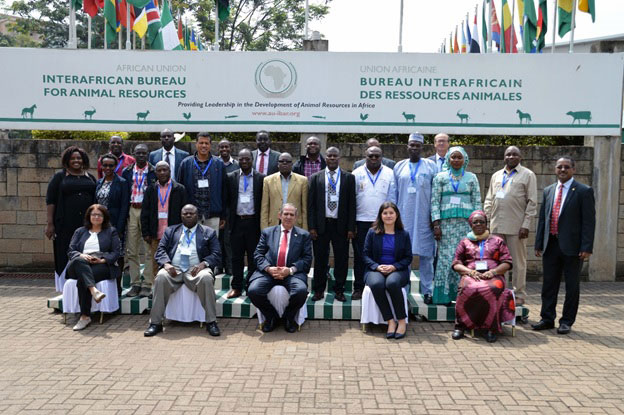
The 3rd Technical and 5th Steering Committee meetings of the project "Strengthening the capacity of African countries to conservation and sustainable utilisation of African animal genetic resources" popularly known as the "Genetics Project" were held in Nairobi Kenya at the African Union-Interafrican Bureau for Animal Resources (AU-IBAR) Offices from the 6th to the 8th of August 2018. The meetings were attended by 28 participants from selected Member States (MS) (Morocco, Guinea), Regional Economic Communities (RECs) (COMESA, EAC, IGAD, SADC, UMA), implementing partners (CIRDES, ILRI), Sub-Regional Focal Points (S-RFPs) for AnGR (ASARECA, CEBEVIRHA, CORAF, INRAA), representatives of farmers’ organizations (National Federation of Professionals of the Livestock and Meat Sector of Togo); sub-regional research and development organizations (WALIC), representatives of non- governmental organizations (Heifer International); the developmental partner/donor (EU) and AU-IBAR.
The Technical meeting (6th to 7th August 2018) was chaired by a representative of COMESA and officially opened by the Director of AU-IBAR, Prof. Ahmed El-Sawalhy who welcomed the participants and thanked them for their roles in the implementation of project activities for the sustainable development and management of African animal genetic resources (AnGR). He informed the meeting that the project had run its 5-year course. However, AU-IBAR had requested for a "no-cost extension" from the the EU. The project team and implementing partners reported on the project activities in the previous year (July 2017 to June 2018), highlighting the achievements and the challenges. The S-RFPs presented the status of AnGR in their respective regions. The technical meeting identified some key issues to be brought to the attention of the Project Steering Committee meeting. The meeting also reviewed and finalized the Exit Strategy for the project.
The 5th Project Steering Committee meeting (8th August 2018). The objectives of the meeting were to:
- assess the progress made in the project implementation since its last meeting
- address key challenges faced by the project coordination team and implementing partners
- suggest and recommend priority actions to finalize the implementation of the project
- chart the way forward for the project.
The meeting was chaired by a representative of the EAC on behalf of the Chairperson of the Project Steering Committee, the Commissioner of the Department of Rural Economy and Agriculture (DREA), Her Excellency, Madame Josefa Sacko. The Director of AU-IBAR, officially welcomed the participants on behalf of H.E. Josefa Sacko. He highlighted some of the achievements of the project including: the pending publication of the State of Farm AnGR in Africa and Catalogue of Cattle Breeds in Africa; the finalization of policy briefs on various aspects of the management and development of AnGR; the development of National Strategies and Action Plans (NSAPs) for AnGR by some MS ; the establishment of breed-specific breeders associations; the equipping of the five (5) regional gene banks; the availability of the Standard Operating Procedures (SOPs) and Material Transfer Agreements (MTAs) for gene banks; and the AnGR Characterization, Inventory and Monitoring (AnGR-CIM) tool; among others. Ms. Myra Bernadi, the representative of the EU Delegation to Kenya, highlighted the importance of AnGR to food security in Africa. She acknowledged the important role the project is playing in conserving African indigenous breeds, some of which are facing extinction. The EU was pleased to support this project and would grant the request for "no-cost extension". Mr. Cleopas Okore, the representative of the Government of Kenya, officially opened the meeting.
The key recommendations of the Project Steering Committee meeting included:
- The need to align NSAPs to Regional Strategies on AnGR hence the call for closer collaboration between RECs and MS
- S-RFPs and RECs to encourage MS to take action on the development of NSAPs as well as policies and legislation on AnGR
- Establish mechanisms for the sustainability of regional gene banks including setting up of technical and steering committees to manage the gene banks within established SOPs
- Roll-out of the AnGR-CIM tool as soon as possible and involve team members of the Taxonomy Advisory Group on AnGR-CIM which actively participated in their development
- AU-IBAR should support the launch of regional gene banks, facilitate the participation of key stakeholders from MS in the official launch to ensure political will, support and ownership.
- Encourage MS to give direct support for the operations and management of S-RFPs
- Encourage and support cross-learning between regions on the establishment and strengthening of breeders associations
- When the 12–months "no-cost extension" is granted, AU-IBAR should inform all stakeholders and partners of the extension and where appropriate, renew relevant agreements. Thereafter, implementing partners and stakeholders are expected to fast-track project implementation.
